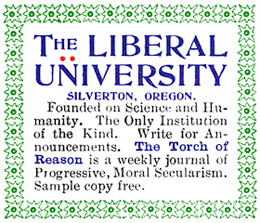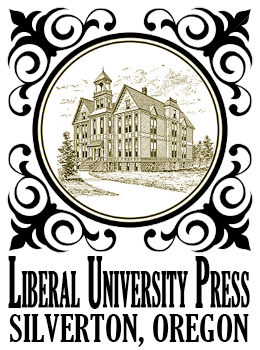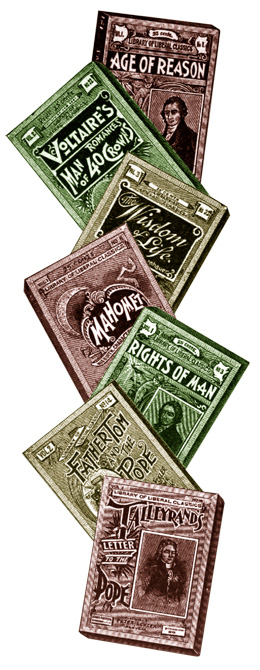By Horace L. Green – June, 1898
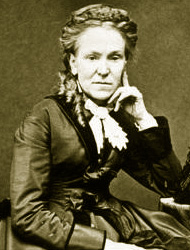 Matilda Joslyn Gage died on the 18th of March at the home of her son-in-law, L. F. Baum, in Chicago, at the age of 72 years.
Matilda Joslyn Gage died on the 18th of March at the home of her son-in-law, L. F. Baum, in Chicago, at the age of 72 years.
In 1863 we opened a law office in the city of Syracuse. On the floor above us was published a temperance paper edited by Dr. Hezekiah Joslyn. We soon made the doctor’s acquaintance. He was an able, enthusiastic reformer, and we became intimate friends. He had. but one child, Matilda Joslyn Gage, the subject of this notice, and he was very proud of her. He read to us an able article written by his daughter that appeared in the Atlantic Monthly, and shortly after introduced her to us. We found her a very bright, intelligent young woman, much interested in radical reforms, but not entirely emancipated from orthodox religion.
Soon after this she, her father and the writer attended, as delegates, a radical Republican convention, held in Cleveland, Ohio, in the fall of 1864, at which John C. Fremont was nominated for President, but who, before the election came off, withdrew in favor of Abraham Lincoln. At that convention we became quite well acquainted with Mrs. Gage and have been well acquainted with her ever since. She was a growing woman, and soon became too large for any orthodox creed.
The first time that she ever spoke on a Free Thought platform was at the Watkins (N.Y.) Free Thought convention, in 1878, when, to our great surprise, she came to us, at that convention, and said she had an address she wanted to deliver that was very severe on orthodox Christianity. She said she expected that her attendance at that convention, and the speech she proposed to deliver, would virtually excommunicate her from the National Woman Rights party, of which she was a very active member, but she must be true to her honest convictions, which were that the Bible and the orthodox church were the two greatest obstacles in the way of woman’s advancement. Her speech was in the same line as that taken by Mrs. Stanton in the pamphlet we recently published, entitled “Bible and Church Degrade Women.” Shortly after attending the Watkins convention she called a convention of the Free Thought Women of America, at Washington, and organized the “Woman’s National Liberal Union,” of which she was elected President.
Mrs. Gage was for a number of years the editor of a Woman’s Rights journal, entitled “The National Citizen,” and was the author of a number of books, the last, and most radical one, entitled “Woman, Church and State,” which has had a large circulation. She was associate editor with Susan B. Anthony and Elizabeth Cady Stanton of the most important work that has ever been published relating to the woman movement, “The History of Woman Suffrage” in three large volumes.
Matilda Joslyn Gage was one of the most indefatigable workers in the cause of humanity that this country has ever produced, and we are glad to publish below testimonials of her worth from a number of her distinguished female acquaintances and co-workers:
By Lucy N. Colman
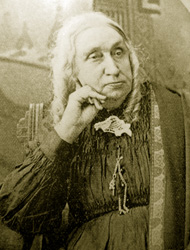 Editor Free Thought Magazine: I’m afraid I shall not be able to say as an obituary all that should be said of the late Mrs. Matilda Joslyn Gage. She was a woman of good intellect, and very superior attainments. I do not know any woman among those who have publicly worked for the cause of “woman’s rights” who equaled Mrs. Gage in knowledge of the condition and position of woman in the past, as well as of the present; perhaps I should except Mrs. Stanton, but Mrs. Gage did not succeed in becoming a popular speaker—she will be regarded in the future much higher than now; as a writer the future will, I think, give her merited justice.
Editor Free Thought Magazine: I’m afraid I shall not be able to say as an obituary all that should be said of the late Mrs. Matilda Joslyn Gage. She was a woman of good intellect, and very superior attainments. I do not know any woman among those who have publicly worked for the cause of “woman’s rights” who equaled Mrs. Gage in knowledge of the condition and position of woman in the past, as well as of the present; perhaps I should except Mrs. Stanton, but Mrs. Gage did not succeed in becoming a popular speaker—she will be regarded in the future much higher than now; as a writer the future will, I think, give her merited justice.
Mrs. Gage early joined the orthodox church, and remained in it many years; when I first knew her she was interested in spiritualism, and I think retained her belief in a future life; she called to see me in the autumn of this year, and from her conversation I found she was something of a theosophist, which seems to be just another phase of spiritualism.
I had hoped that Mrs. Gage’s removal to Chicago would bring her more content and happiness than she experienced in Fayetteville, and that the use of her pen would continue to help the cause which was of so much consequence, in her estimation, in lifting the world to a higher plane. Mrs. Gage died comparatively young, and certainly the work which she loved has lost a valuable champion. Her late published work, “Woman, Church and State,” was rejected by the librarian of the “public library” in Fayetteville, but there are libraries all around the country easily reached, where the book 1s found; the refusal has only made the ignorance and bigotry apparent, and some time Fayetteville will be ashamed, not of the book but of the librarian who excluded it.
By Lucinda B. Chandler
Editor Free Thought Magazine: With the passing of Matilda Joslyn Gage, a noble and sorely fettered spirit has entered a freer life and lain off a physical form that had become a heavy burden. The work of Mrs. Gage through a period of thirty years for the improvement of the political and social conditions of women, is a matter of history.
Her chief peculiarity of mind was her persistent search for the causes of all conditions in mental states and social institutions. Her work, “Woman, Church and State,” was the result of her earnest endeavor to find why and how women had been compelled to accept and .remain in a subordinate position, religious and political, and why marriage laws had made her the subject of an owner and master instead of a coequal partner. Liberty was to her the priceless possession, and the ceaseless aspiration of her soul was that humanity might be kept from all forms of oppression, ecclesiastical and civil.
The last two years of her stay her thoughts were concentrated upon metaphysical subjects, and the phenomena and philosophy of Spiritualism and Theosophical studies. During her critical illness in 1896, she experienced some illuminations that intensified her interest in psychical research. Her state of health after that illness was very precarious, and she suffered greatly from physical weakness and depression of spirit. But at no time did her mental vigor abate. It was remarkable how she kept in mind all current events of importance, and especially everything bearing upon the conditions, opportunities, and achievements of women.
To her analytical mind the facts and truths of the invisible and psychical realms of being became a philosophy that gave a larger and grander meaning to life. The occult sciences of Astrology and Palmistry were fascinating to her. It became a satisfying truth to her that the things that are not seen are greater than the things that are seen. That Matilda Joslyn Gage accomplished a grand and helpful work for woman and humanity will appear more perfectly as the evolution of manhood and womanhood proceeds. That she was prepared for and is now enjoying the freedom she longed for is a satisfaction to the loved ones still waiting here.
By Sara A. Underwood
Editor Free Thought Magazine: It was not my good fortune to know Mrs. Gage in her earlier years, though I knew of her work as a lecturer and writer, and was a subscriber to her “National Citizen” during the four years she was its editor an9 publisher, and I was therefore familiar with her thought, which was always aflame with love of liberty for herself, for her sex, and for all humanity.
During the last years of her active, earnest life, she made frequent visits from her home in Fayetteville, N.Y., to that of her youngest daughter in Chicago, whence she so recently “crossed the bar”—and during those years I frequently met her for an interchange of views on the various subjects in which we were mutually interested.
Mrs. Gage must have been beautiful in her girlhood, for even at 70 she was a woman of fine presence and striking appearance, with her slim, erect form, clear complexion, touch of girlish bloom on her cheeks, silken, silvery waves of hair and brilliant eyes. There was still a certain air of youth about her movements, her conversation was breezy, her thought abreast of the times, and her sense of humor unimpaired. She was one of those bright souls who bid defiance to age in thought and expression to the last. Even on her sick bed she penned the address she had been asked to deliver before the National American Woman’s Suffrage Association, which met in convention at Washington, D. C., in February, her subject being “Woman’s Demand for Freedom; Its Influence Upon the World,” a subject which the author of the work entitled “Woman, Church and State” was splendidly equipped to cope with. She was not, however, able to go to Washington, but her address was ably read by Rev. Anna Shaw.
Like Mrs. Stanton, Mrs. Gage had early taken as decided a stand for perfect freedom in religious as in political rights for both sexes. And she made it a large part of her public work to show that Christianity had done little for woman’s advancement, in spite of its professions. While she wrote much on other subjects, and was identified with Mrs. Stanton and Miss Anthony in the authorship of “The History of Woman’s Suffrage,” yet the work dearest to her heart was her large and carefully prepared volume on “Woman, Church and State,” published shortly before her death, and to which she had devoted years of study, thought, and preparation.
This voluminous work shows extensive research in history and in theological literature, and it is a valuable contribution to the record of woman’s condition in all ages and countries, and of her social and intellectual development. The history of marriage and information in regard to the various forms of marriage which have prevailed, are given with great fullness in this book. I am not acquainted with any other work in which the influence of theology and ecclesiasticism is so clearly and thoroughly shown in its opposition to woman’s advancement. Mrs. Gage had come to regard theological Christianity as the greatest obstacle to woman’s freedom of thought and to the attainment to her rightful legal position; and tl1is is the reason that the author of “Woman, the Church and the State” devoted so much space to the refutation of Mosaic and Pauline teachings and identified woman’s progress with the gospel of Free Thought and radical reform. The book is a mine of information on the subject treated, and much of the information given before this work appeared was not easily accessible -to the ordinary reader.
So strong was her interest in religious, as well as political, liberty for her sex, that in 1878 she organized the association known as the Woman’s National Liberal League, of which she was made President, the object of which was work for State Secularization, and to enlist women in behalf of Free Thought and expression in every direction.
Despite the fears of the opponents of Woman Suffrage that the reform might interfere with the duties and interests of home and motherhood, Mrs. Gage—as well as Mrs. Stanton, Lucretia Matt, Mary A. Livermore, and many other workers for the enfranchisement of their sex—was an excellent housekeeper and a loving wife, mother, and grandmother, and her children, several of whom are still living, were devoted to her, as she was to them. I can speak from personal knowledge of the strong bond of loving, sympathetic thought and interests existing between Mrs. Gage and her daughter, Mrs. Baum, a woman lovely in character, disposition, and person, at whose home she passed away, and who has been greatly prostrated by the event of her beloved mother’s demise. And to judge from Mrs. Gage’s frequent loving reference to her other children, there was a very united family, though the mother was a Suffragist.
It may interest those readers of the Free Thought Magazine who have lost all belief in the continuity of life beyond this material plane, to know that, despite her liberal opinions (perhaps I might better say because of that Liberality of thought), Mrs. Gage most sincerely believed in the law of progressive evolution in the realm of spirit as well as of matter, and like Gail Hamilton and various others, she had good reasons for that belief from personal experiences. Two years ago she had a severe attack of grippe, when her life was despaired of, and her children were sent for to bid her farewell. She passed into a state of semi-unconsciousness, and as her daughter told me at the time seemed to be holding conversation with some friends whom she called by name, who had previously left the body. In a day or two she rallied, much to their surprise and joy, and afterward pretty fully recovered, and it was from her own lips that I was given a most interesting account of what she clearly remembered as her experiences on the borderland between this life and what we misname death. She saw and conversed with her father and mother and many other friends whom she knew as “dead”—was delighted and deeply interested in the appearance of what she thought was to be her new home, and felt sad when she was told that it was decided that she must return to this phase of life for a season.
When once she had arrived at a conclusion on any subject, by study and reason, Mrs. Gage was strong in her convictions and fearless in regard to giving them expression. Her moral courage was strong to defy public opinion even to the point of aggressiveness. In spite of her sex she had pre-eminently one of the virtues of a good soldier in that the uproar of contention served as a stimulus to her spirit and nerved and steadied her for the battle in defense of rights. I will conclude this brief tribute to one of the modern heroines of Free Thought by an extract from one of her daughters—Mrs. Carpenter—in regard to her death and funeral. She writes:
“Mother’s death was a surprise and shock to us all, although she had been ill all winter, confined to the house since November. During February we thought her slowly improving, and she was planning to go to her old home this spring, but Sunday, the 13th of March, she was stricken with paralysis, and died the following Friday, without regaining consciousness. The funeral was held at the house Monday afternoon. Mother lay in a profusion of flowers, which she so much loved, and we hope she is now in the enjoyment of the Rose Garden of her vision. By her own request her body was cremated at Graceland.”
It is typical of the advanced woman’s quick adoption of the most sane and sanitary methods that such women as Lucy Stone, Frances Willard, Rosa Miller Avery and Matilda Joslyn Gage have decreed that their bodies should be cremated. Apropos of this another “advanced” woman and a poet, writes me to-day: “Yes, I’m a thorough lover of cremation, and cannot bear to think of any other disposition of my ‘leavings.’ I do not like the idea of submitting to have them ‘lie moldering in the grave;’ if they should the ‘ghosts that sit on tombstones’ will be likely to hear some complaining from me, if I do have to submit to such a slow process of dissolution—and, oh the sadness of laying away the body in which our dear one dwelt.”
By Elizabeth Cady Stanton
 Editor Free Thought Magazine: In the death of Matilda Joslyn Gage the Woman’s Suffrage Association has lost one of its most able speakers, writers and actual thinkers. She and Ellen Batelle Dietrick have each published a book on woman’s position, under church discipline, of the Canon law, that should be in the hands of every thinking woman. Would that their silent lips could speak through these written pages and emancipate the mothers of the race from a blind faith in religious superstition. As the years roll on women will appreciate more highly these books, unheeded now. The loss of these two women is irreparable; there are none to fill their places.
Editor Free Thought Magazine: In the death of Matilda Joslyn Gage the Woman’s Suffrage Association has lost one of its most able speakers, writers and actual thinkers. She and Ellen Batelle Dietrick have each published a book on woman’s position, under church discipline, of the Canon law, that should be in the hands of every thinking woman. Would that their silent lips could speak through these written pages and emancipate the mothers of the race from a blind faith in religious superstition. As the years roll on women will appreciate more highly these books, unheeded now. The loss of these two women is irreparable; there are none to fill their places.
Mrs. Gage was early trained to think and to express her opinions. Being an only child, her parents devoted all their leisure hours to her education. Her father, Dr. Hezekiah Joslyn, was a man of profound thought-well versed in the natural sciences, a skillful physician, and identified with the reforms of the day. Her mother, Helen Leslie, was born in Scotland; she was highly educated, belonged to a noble, influential family, and was married when quite young to Dr. Joslyn. Their home in Central New York was always a most pleasant resort for Liberal thinkers on religion, politics and social ethics. To their discussions the young daughter listened with keen satisfaction and thus early learned the difference between logical reasoning and mere dogmatism.
Mrs. Gage’s latest literary labors were given to “The Woman’s Bible.” Her astrological commentaries on “The Revelation” mitigate, in a measure, the terrible pictures as they appear in plain English to the ordinary mind. It is a great pity that many of the chapters in that ancient collection had not been left in the original Greek and Hebrew, as they bring no divine message to the understanding of common mortals.
In the closing years of her life Mrs. Gage was much interested in the occult mysteries of Theosophy and other Eastern speculations as to reincarnation .and the illimitable creative power of man.


